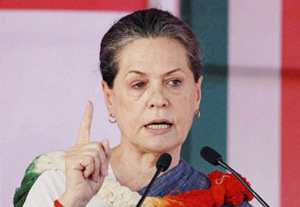Bhagalpur, Oct 3: Attacking Prime Minister Narendra Modi and BJP, Congress President Sonia Gandhi today asked people to reject those who divide society and make false promises and alleged that there was match fixing between his party and the RSS on quota issue.
Addressing her maiden poll rally in Kahalgaon near here for the upcoming Bihar polls, she attacked BJP on the issue of reservation and said her party is committed to the Constitutional policy of quota for SCs/STs and the poor.
Describing Bihar polls as 'decisive', Sonia said, "Bihar is at a crucial crossroad. From here will be determined the future of both Bihar and the country. You have to decide whether from here on the country will move towards divisiveness or harmony."
Kick-starting her party's poll campaign, she said the Prime Minister is an expert in packaging and repackaging.
"Modi is trying to mislead the people of Bihar. The package he announced is more farcical than real. What is the truth of this package? Prime Minister, an expert in packaging and repackaging, has simply rehashed old schemes of previous governments and presented them as a new package. What not he has said to belittle the people of Bihar," she said, asking people to choose whether they are with secular forces or those which divide the country.
Raking up RSS chief Mohan Bhagwat's remarks on reservation, Sonia, without naming Bhagwat or RSS, said, "There is match fixing going on between Nagpur and BJP. But I want to tell you that Congress is committed to Constitutional provisions on SC, ST and OBC quotas."
Terming the 15-month rule of Modi as "harmful" for the country, the Congress chief said, "Except for a few corporates no one has benefited".
"You are all aware of the 15-months' record of BJP's policies that have adversely affected the country. Hasn't unemployment increased, have budget cuts not been made on welfare schemes for women, are farmers getting fair price for their produce," Sonia said mocking at the NDA alliance as "Bhanumati ka kunba" (coming together of odd forces).
"Put all your strength to defeat such forces who want to divide society, make false promises and who have hurt Bihar's pride," she said.
Seeking votes in the name of Chief Minister Nitish Kumar, whom she described as an "able CM with a clean image", she also questioned the PM over his foreign trips taunting him for "spending more time abroad than at home".
Sonia also charged that Modi was discriminating with opposition chief ministers and states ruled by them and questioned his 'sabka saath, sabka vikas' slogan, asking whether people of such states did not belong to the country.
Sonia said, "Modi is discriminating against opposition chief ministers and the states ruled by them. He talks of 'sabka saath, sabka vikas' (development of all), but do people in these states not belong to the country."
Targeting the Prime Minister on his foreign trips, she said, "Narendra Modi loves going abroad very frequently. He loves embracing famous people but he has no time for the poor. He should go abroad but should stop playing politics of pretension with the people who reposed faith in him."
Sonia also reminded people of the rising unemployment, budget cuts in social welfare schemes and low MSP for farm produce to ask the gathering at the rally what the Modi rule had yielded for the poor.
Reminding people of the "ill-effects" of 15 months of Modi rule on the country, she exhorted people to put all their strength to defeat NDA, she said, "What all did he not say to belittle the people of Bihar. But he does not know that you are all aware and know about his political intentions."
Hailing people of the area, where BJP candidates were defeated both in last Lok Sabha polls and assembly bypolls, she said, "You have not believed in the hollow promises of Narendra Modi and have rejected BJP's policies."
She said Nitish Kumar is a chief minister with a clean image. She also took a dig at the NDA partners saying, "those who talked of secularism all along are today standing with communal forces".





Comments
Add new comment